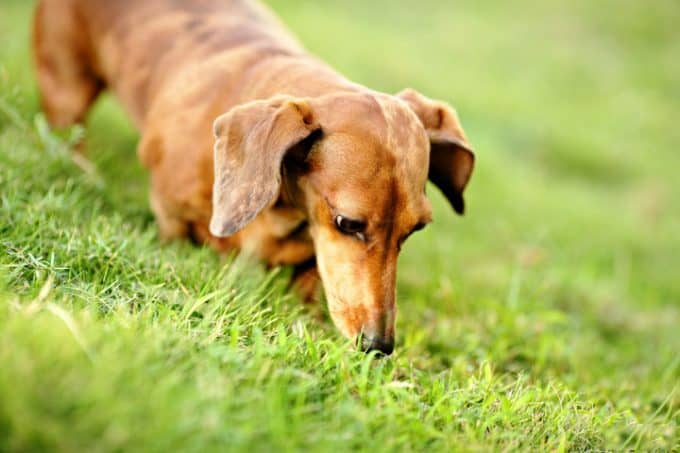Have you caught your dog munching on the grass during walks or in the backyard? Maybe you’ve wondered if this strange snacking habit is normal or if you should be concerned. Don’t worry – grass eating is one of the most common behaviors in dogs, and understanding why they do it can help you better care for your furry friend.
Related post: Common Dachshund Health Issues To Be Aware Of

Is It Normal for Dogs to Eat Grass?
The short answer is yes – grass-eating is completely normal for dogs. Research shows that most dogs eat grass at some point in their lives, and surprisingly, less than 25% ever vomit afterward. This behavior isn’t just limited to our domestic pets either. Scientists have observed wolves and wild dogs consuming plant material in the wild, suggesting that grass-eating is a natural part of canine behavior that’s been around for thousands of years.
Related post: Dachshund diet and exercise
Understanding Why Dogs Eat Grass
Natural Enjoyment and Instinct
Just like humans have different food preferences, many dogs simply enjoy eating grass. They might particularly love:
- The fresh, sweet taste of spring grass
- The crisp texture of new growth
- The satisfying act of grazing
- The natural foraging experience
This preference often changes with the seasons. You might notice your dog showing more interest in grass during spring and early summer when it’s tender and new.
Digestive Benefits and Dietary Needs
Dogs sometimes turn to grass as a natural digestive aid. Here’s how grass can help:
- Adds necessary fiber to their diet
- Helps move food through their digestive system
- May settle an upset stomach
- Could provide missing nutrients
Think of grass as nature’s supplement – dogs might instinctively know when they need these extra elements in their diet.
Behavioral and Emotional Reasons
Sometimes grass eating has deeper roots in behavior:
- Boredom or lack of stimulation
- Attention-seeking behavior
- Stress or anxiety relief
- Natural scavenging instincts
- Learned behavior from other dogs
The Science Behind Grass Eating
Recent studies have revealed interesting facts about why dogs eat grass:
- It’s considered a normal part of modern dogs’ behavior
- Most dogs eating grass aren’t sick beforehand
- The behavior often has no negative health consequences
- Wild canines also eat grass occasionally
- Some experts believe it’s an inherited behavior from ancient times
When Should You Be Concerned?
While grass eating is usually harmless, certain situations warrant attention:
Warning Signs to Watch For
- Excessive or obsessive grass-eating
- Sudden increases in grass consumption
- Eating grass alongside other unusual behaviors
- Signs of digestive upset
- Lethargy or depression
- Loss of appetite for regular food
Potential Health Concerns
Pay attention if grass eating is combined with:
- Frequent vomiting
- Diarrhea
- Decreased appetite
- Weight loss
- Excessive drooling
- Pawing at the mouth
Comprehensive Solutions
Enrichment and Exercise
A well-stimulated dog is less likely to seek out grass:
- Schedule regular exercise sessions
- Vary walking routes for new experiences
- Provide interactive puzzle toys
- Arrange playdates with other dogs
- Create obstacle courses
- Practice new tricks and commands
Effective Training Techniques
Help your dog develop better habits:
- Teach and reinforce the “leave it” command
- Use positive reinforcement consistently
- Carry high-value treats on walks
- Redirect attention to appropriate activities
- Reward good choices
- Practice recall commands
Diet and Nutrition
Ensure your dog’s nutritional needs are fully met:
- Feed high-quality, balanced dog food
- Consider adding fiber-rich vegetables
- Maintain regular feeding schedules
- Monitor portion sizes
- Discuss supplements with your vet
- Ensure fresh water is always available
Safety Considerations
While grass eating is natural, take these important precautions:
Environmental Safety
- Avoid areas treated with pesticides or herbicides
- Keep dogs away from freshly fertilized lawns
- Watch for toxic plants mixed with grass
- Be cautious of areas where wildlife might leave droppings
- Check for dangerous objects hidden in the grass
- Monitor grass length and potential hazards
Health Monitoring
Keep track of:
- Water consumption
- Frequency of grass-eating
- Amount of grass consumed
- Any changes in behavior
- Digestive symptoms
- Overall energy levels
Related post: How To Handle A Picky Eating Dog
Is eating grass harmful?
Eating grass is not harmful to dogs. Except if your dog grazes on a lawn that has been treated with pesticides, herbicides, or fertilizers. These chemicals can be toxic to your dog if ingested. Some varieties of garden plants could be poisonous to dogs. Only let your dog eat grass in lawns that you are certain haven’t been treated with chemicals. For more information check the ASPCA’s Animal Poison Control Center website.
When to Consult Your Veterinarian
Professional advice is recommended if you notice:
Immediate Concerns
- Excessive grass consumption
- Frequent vomiting or retching
- Signs of intestinal blockage
- Significant behavior changes
- Loss of appetite
- Lethargy or depression
Long-term Considerations
Discuss with your vet:
- Dietary adjustments
- Behavioral modifications
- Potential underlying issues
- Preventive measures
- Regular health monitoring
- Nutritional supplements
Understanding Your Dog’s Individual Needs
Every dog is unique, and their grass-eating habits might vary based on:
- Age and health status
- Breed characteristics
- Individual personality
- Daily routine
- Diet and exercise habits
- Environmental factors
The Bottom Line
Grass eating is a normal canine behavior that rarely indicates a serious problem. By understanding why your dog eats grass and taking proper precautions, you can keep them safe while letting them follow their instincts. Remember that moderation is key – a little grass munching is usually nothing to worry about, but significant changes in this behavior should be discussed with your veterinarian.
If you want to find the best pet insurance for your dachshund, click here.
Recent Posts
Calculate the perfect food portions for your dachshund with our specialized calculator. Get customized feeding recommendations based on size, age, and activity level to support your wiener dog's back...
Looking for the perfect gift for a proud dachshund mom? We’ve rounded up the cutest dachshund shirts that celebrate your love for wiener dogs in style. Whether you’re shopping for yourself or a...



